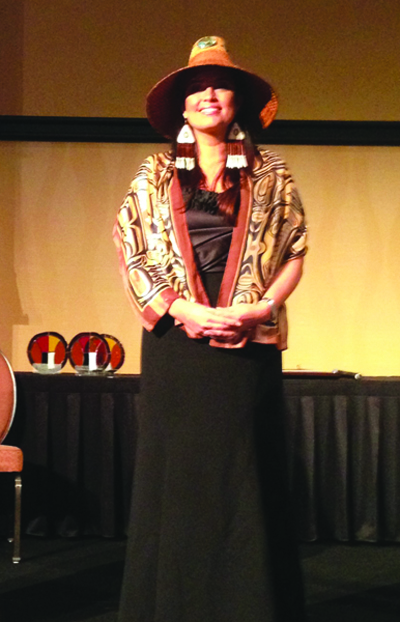Tulalip Vice-Chairwoman Deborah Parker among the honored

Photo/Theresa Sheldon
By Niki Cleary, Tulalip News
“There are two ways of spreading light. To be the candle, or the mirror that reflects it.” – Edith Wharton
TULALIP – Every year the Potlatch Fund recognizes Native Americans who personify leadership in five areas. Each of the awards is named after a tribal leader who exemplifies what it takes to change the world: The Antone Minthorn Economic Devlopment Award, the Pearl Capoeman-Baller Civic Participation award, the Billy Frank, Jr., Natural Resources Protection award; the Patricia Whitefoot Education Award and the Fran James Cultural Preservation Award. This year, Tulalip’s own Vice-Chairwoman Deborah Parker was among the recognized. She spoke about the experience in a recent interview.
Asked about the award, Parker first spoke about Quinault leader Pearl Capoeman-Baller.
“I’ve known Pearl for years,” she said. “She’s a woman who doesn’t really sit down, she doesn’t rest. She’s a woman who’s always wanted change and works hard to make that change happen. She’s a lady who is all about action and justice.
“To receive an award in the spirit of her work is a complete honor. And as a leader, Pearl embodies that balance of home, work and responsibility. She’s a mother, a grandmother, and a community member who works at the local, state and federal level and she brings all of that together. As an elder she is not on council anymore, but you still see her at conferences helping and motivating the younger generation to not be idle. She’s still working hard and not taking no for an answer.”
“There is no agony like bearing an untold story inside of you.” – Maya Angelou
Although she’s made impacts in many areas, Parker points to her work to make sure that provisions to protect Native American’s from non-natives were included in the reauthorization of the Violence Against Women Act (VAWA).
“It’s not just women, it’s also men who are very emotional about the passage of this bill,” elaborated Parker. “If I was just carrying legislation it would be easy to say thank you and good bye. I used my story, there was no hypothetical here. They had to look me in the face, someone who is a survivor. Being a female tribal leader was another source of strength. People in D.C. had to look at me and say, ‘No, we’re not going to support you or other Native women.’
“Some did,” she continued. “Some said they couldn’t support tribes taking jurisdiction, some were blatantly racist and said they couldn’t believe a non-tribal man would rape a Native American woman. But, what I don’t think anyone imagined is the support. There was so much support from non-tribal women. Native America hasn’t seen that in the past, non-natives supporting legislation to support Native people.”
“When we do the best we can, we never know what miracle is wrought in our life, or in the life of another.” – Helen Keller
Undeniably a role model across the nation, Parker was quiet, embarrassed even, when she talked about her notoriety.
“For the women who come out and say, ‘You’re my hero,’ and every time I receive an award, I feel honored. I accept it on behalf of those women who were murdered, for those women who don’t have a voice. Not just women, I want to acknowledge the young boys and men who have been abused. They need closure too, but where do they get it? Guys don’t stand around the lunch room and talk about sexual abuse because of that stigma surrounding it.”
Family and community continually inspire Parker to keep working.
“My children are 100% supportive. They get to hear my phone calls, they hear the conversations, they hear me fighting for our rights. It’s been a blessing, but being away from my family is the hardest part. If someone asks what it’s like to be a modern day warrior, you give up a lot in the process. My family sacrificed birthdays, holidays, they really put aside everything so we could get this [VAWA] passed.”
“The most effective way to do it, is to do it.” – Amelia Earhart
The Violence Against Women Act including the tribal provisions were approved. Parker explained that although we won the battle, the war’s not over.
“I just have to remind myself to keep going,” she said. “There’s so much work to be done. It’s not just me. There are a lot of amazing tribal leaders who pitch in.”
Parker explained that one of the most important ways to take care of her people is to be in the room where decisions are made. For tribal leaders a trip to Washington D.C. isn’t a vacation, it’s a battleground of constant negotiation, education and efforts to dispel stereotypes about Native Americans.
“If you don’t go, if your face isn’t there, you don’t have a voice,” Parker emphasized. “It’s not what you look like, it’s what you represent. If you are not at the table, you’re not included.”
“Everyone has inside her a piece of good news. The good news is that you don’t’ know how great you can be! How much you can love! What you can accomplish and what your potential is!” – Anne Frank
In closing, Parker exuded hope for the future.
“I feel incredible honored that young girls are inspired to share their voice, to come out with their abuse because I have. I feel honored because they can come out and speak their truth and find healing, not just one, but hundreds and thousands. It is worth it.
“If women can find strength through my words, I’m definitely not going to stop,” she stated. “If I can assist others to create protections for those little children who don’t have a voice, those are giant steps. I never dreamed this could happen in my time.”
